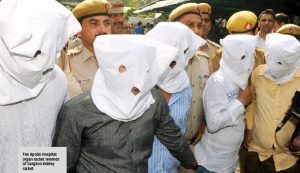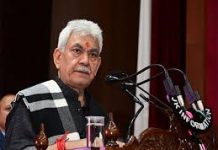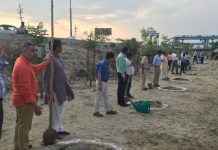 It had come under scanner sometime back too. The arrest of 10 persons and questioning of nephrologists of Indraprashtha Apollo Hospitals by Delhi Police points to the involvement of reputed private health institution’s complicity in unethical kidney rackets in the country. Are Apollo Hospitalsjust much ado about nothing or they are really involved in wrong doings. Tehelka tries to find out.
It had come under scanner sometime back too. The arrest of 10 persons and questioning of nephrologists of Indraprashtha Apollo Hospitals by Delhi Police points to the involvement of reputed private health institution’s complicity in unethical kidney rackets in the country. Are Apollo Hospitalsjust much ado about nothing or they are really involved in wrong doings. Tehelka tries to find out.
In the present case, Sangita Reddy, Managing Director of Apollo Medskills, a subsidiary of Apollo Hospitals and five key officials identified as Radhakrishna Nallapati, Chief Financial Officer, K Prabakar, Ex-CEO, Karthik Radhakrishnan, Finance Manager, Sridhar Srinivas, Chief Marketing Officer and Pulijala Srinivasa Rao, CEO are currently booked under Sections 465 (forgery), 468 (forgery for purpose of cheating), 471 (using forged as genuine) and 420 (cheating) of the IPC.
The Supreme Court of India issued the notice to Sangita Reddy on a petition filed by SkillsTech, a Chennai-based consulting firm. The Madras High Court, while making it clear that the investigation should go on concerning the registered FIR had granted temporary interim relief to Sangita Reddy. In a subsequent hearing, on 29 July 2019 the Madras High Court order for the case to heard in eight weeks as it is a well-settled principle in law that neither power under Section 482 CrPC nor the jurisdiction under Article 226 can be exercised by the High Court to quash the complaint if prima facie commission of offences is made out. However, the case file went mysteriously missing for nearly a year and reappeared only after a new team of advocates were appointed.
Mystery of missing files
Files going missing from the Madras High Court has been widely reported in the media and criticized as a ploy to deny justice. In July 2018, Justice G Jayachandran said “It is alarming to note that case bundles, hundred in number, disappearing… like missing vessels in the Bermuda triangle,” and he even directed the Central Bureau of Investigation (CBI) to investigate the matter wherein papers related to over 100 cases went missing. The Madras High Court had also ordered a CBI-CID inquiry into other 55 case files disappearing in a similar manner.
Forensic report
The forgery was established by a forensic report in possession of the Tamil Nadu Police. The signatures on the alleged forged tax documents were electronically reproduced from an original document of a later date. Therefore, the forged document could not have been produced before the date of the original document. The forensic report also reveals numerous other discrepancies in the tax documents exposing the alleged cognizable offence.
Earlier kidney racket
It was sometime back that Bollywood Superstar Aamir Khan had exposed malpractices in medical profession through his popular TV show “Satyamev Jayate” leading to an uproar by the Indian Medical Association, seeking an apology from him and later saying that he was ready to face any legal action. “If the medical profession had been insulted and defamed by anybody, it is probably by those who are indulging in unethical practices and not by the show which was not against doctors or medical professions,” Aamir had said.
The arrest of 10 persons and questioning of nephrologists of Indraprashtha Apollo Hospitals by Delhi Police pointed to the involvement of reputed private health institution’s complicity in unethical kidney rackets in the country. The Apollo Hospital kidney racket was a reminder of Gurgaon kidney racket, whose mastermind Amit Kumar was arrested from Nepal.
Kidneys from poor people from western Uttar Pradesh were transplanted on to affluent patients from the United States, United Kingdom, etc. for large sums of money. In the early 2000s, there was the Amritsar kidney racket said to be worth 200 crore wherein poor people were being exploited. They were given a pittance for kidneys which were transplanted to rich people through fake documents.
In the year 2015, Hyderabad Police cracked a kidney racket by arresting a doctor for selling a “kidney package” for 30 lakh and above, arranging donors, taking patients abroad for surgery etc.
According to data complied by the Indian Transplant Registry, of the 21,395 kidney transplants that have been performed in the country since 1971, a meagre 783 came from cadaver donors. The annual requirement is over two lakh kidneys in the country clearly showing a mismatch between demand and supply exposing poor unassuming victims to exploitation by the scamsters. Kidneys managed for pittance by the poor are then transplanted into patients for large sums.
Organs and tissue transplants are governed by the Transplantation of Human Organs and Tissues Act, 2011. As per the Act, the organs can either be retrieved from cadavers or from brain dead patients with the family consent or may be donated by living donors. The donors that are recognised by law are near relatives like spouses, parents, siblings, grandparents, grandchildren; others who can donate out of affection and attachment or for a special reason but not for financial considerations.
A comprehensive set of documentation is required including affidavits with photographs of both the donor and the recipient certified by a first class magistrate. There are in-camera interviews too. Two separate committees for related and unrelated donors evaluate and clear cases. The committee that looks at procedures involving related donors comprises hospital staff, but people who are not part of the treating team. For unrelated donors, there are two nominees of the government who evaluate the cases.
In the Apollo kidney racket, the police found that assistants of the transplant surgeon in the hospital drew up fake documents and got donors for patients who were willing to pay hefty sums for the organs. In such a scenario, the doctors naturally find an escape route and say, “We are doctors, not an investigating agency. We have to go by the documents that have been placed before us. We do not have the wherewithal and paraphernalia to check their veracity”.
In this case, the names of the three doctors of Apollo Hospitals had emerged during the interrogation of the racket’s kingpin Rajkumar Rao, who was allegedly operating in different states and had established links with similar cartels in other countries. Ten persons, including two personal assistants of a nephrologist, several middlemen, and donors including two women, two touts besides the kingpin were arrested in connection with the racket. This was confirmed by the then, Deputy Commissioner of Police Mandeep Singh Randhawa.
The arrest of the alleged mastermind T Rajkumar from Kolkata along with three donors including two women from Uttar Pradesh’s Kanpur and a man from West Bengal’s Siliguri showed that the roots of the malady had spread to other parts of the country. Brajesh Chauhan (40) was found to be involved in clearing five kidney transplant cases, which were brought to him by the kingpin, T Raj Kumar Rao.
It was also found that Rao was in touch with a former associate in Jalandhar through his Facebook profile under the pseudonym, Raj Sangam, and had also accepted advance payments for transplants. Police suspected that few of the patients may have been medical tourists from Afghanistan and Africa. The kingpin was suspected of having run similar rackets in Nepal, Sri Lanka and Indonesia.
 Apollo Hospitals in a statement had said, “While all due precautions were conducted, fake and forged documents were used for this racket with a criminal intent”.
Apollo Hospitals in a statement had said, “While all due precautions were conducted, fake and forged documents were used for this racket with a criminal intent”.
Organ donation, specifically kidney donation that has often snowballed into a major racket, fuels the black markets is the result of a chronic shortage of organs available for transplant. The 2011 Transplantation of Human Organs and Tissues Act says that organs can either be retrieved from cadavers or from brain-dead patients with the family’s consent or may be donated by living donors. The process of organ donation involves procurement of an extensive set of documents including an affidavit. A committee then screens the documents.
In December 2015, Minister of Health and Family Welfare JP Nadda had highlighted the problem in Parliament. “There is a huge gap between the demand and supply of human organs for transplantation. The government accords a very high priority for increasing donation of cadaver organs to bridge the gap between demand and supply and save the lives of a large number of persons suffering from end-stage organ failure”. Nadda had indeed hit the nail on the head!
Wrong doings at other hospitals
The wrong doings of the top ranking hospitals have often shaken up the collective conscience of the people, but the noise gradually dies down and the five-star hospital business continues flourishing. In its probe report submitted sometime back to the Manohar Lal Khattar Government in Haryana over allegations of medical negligence in the dengue death of a seven-year-old girl, Adya Singh, at Fortis Hospital in Gurgaon, the three-member expert committee has found that “withdrawal of life support by the hospital in the ambulance amounts to negligence and is against law”.
The girl had died after 15 days of intensive care while the hospital had billed the family more than 16 lakh as the cost of treatment. The report says that “under the garb of leave against medical advice, the hospital disposes of the patients in an unethical manner when attendants no longer want to continue the treatment.” The report goes on to point out that “There is lapse, negligence and unethical conduct as oxygen was taken off and life support was withdrawn though the patient was neither brain dead nor in a vegetative state but alive as per the statement of the treating doctor. Hence the case is recommended to be sent to Medical Council of India for action while all senior doctors treating the girl should be held accountable.”
Haryana’s Health Minister Anil Vij said that the state government had asked the Haryana Urban Development Authority (HUDA) to cancel the land lease of Fortis hospital. He said that there were directions to inform the government about all dengue patients, but the hospital failed to do so and a notice had also been served in this regard.
The case also reminds the authorities of their failure to provide affordable and quality health care forcing people to visit these five star private hospitals. A civilized society must be able to provide people affordable and quality health care. In the case of Max Hospital, Shalimar Bagh, a panel formed by the Delhi Government has found that the hospital had erred in declaring a premature baby dead by not adhering to prescribed medical norms in dealing with newborn babies.
The report in this case found that no ECG was done to check if the child was alive and the body was handed over without written instructions. The dead and the living twins were not kept separately. The boy along with a twin sister was born on November 30 and both were declared dead and handed over to parents in a polythene bag. However, just before the last rites, the family discovered that the baby boy was breathing. The infant later died after a few days at a nursing home in Pitampura. The police have registered a case in this connection.
The Delhi Government had then cancelled the licence of Max Hospital, Shalimar Bagh, with immediate effect for alleged medical negligence. Also, the keeper of the hospital has been directed to “refrain from admitting any new indoor patient and stop all outdoor treatment service in the premises with immediate effect”.
In a tweet, Delhi Chief Minister Arvind Kejriwal had said, “We do not want to interfere in the functioning of private hospitals, but if patients are looted and cheated and the hospitals are guilty of criminal negligence, being a responsible government, we will interfere in such cases.”
 Max Healthcare authorities, in a statement issued hours after the cancellation of the licence, said, “We have not been given adequate opportunity to be heard. We strongly believe that this ruling is harsh as even if there is an individual error of judgement, holding the hospital responsible is unfair and it will severely limit the ability of patients to access treatment. This will compound the shortage of hospital facilities in the national capital.” Meanwhile, the hospital terminated the services of two doctors allegedly involved in this case. How top hospitals are enriching themselves could be understood from the investigation by the Deputy Director General of the Competition Commission of India who found that Max Super-specialty Hospital, Patparganj, has been making 275 per cent to 525 per cent profit on sale of disposable syringes by abusing its dominant position to force inpatients to buy such products from its own pharmacy. The report also detailed how the extracting of such “huge profits margins” from inpatients was prevalent across all 14 hospitals of the Max group. The report, in fact, indicates that the practice of corporate hospitals making huge margins from inpatients is widely prevalent.
Max Healthcare authorities, in a statement issued hours after the cancellation of the licence, said, “We have not been given adequate opportunity to be heard. We strongly believe that this ruling is harsh as even if there is an individual error of judgement, holding the hospital responsible is unfair and it will severely limit the ability of patients to access treatment. This will compound the shortage of hospital facilities in the national capital.” Meanwhile, the hospital terminated the services of two doctors allegedly involved in this case. How top hospitals are enriching themselves could be understood from the investigation by the Deputy Director General of the Competition Commission of India who found that Max Super-specialty Hospital, Patparganj, has been making 275 per cent to 525 per cent profit on sale of disposable syringes by abusing its dominant position to force inpatients to buy such products from its own pharmacy. The report also detailed how the extracting of such “huge profits margins” from inpatients was prevalent across all 14 hospitals of the Max group. The report, in fact, indicates that the practice of corporate hospitals making huge margins from inpatients is widely prevalent.
Shockingly, the Delhi Medical Council admits that a majority of the complaints it receives are against medical negligence. According to DMC president Arun Gupta, “about 70 per cent complaints are against private hospitals and the rest against government hospitals. In the last two years, we have received 521 complaints. While the direct reason cited is wrong treatment or unnecessary procedure, the underlying cause of complaints is often over billing”.
Significantly, the DMC receives one the highest number of complaints among all state medical councils. In the last two years, 48 doctors have been de-registered from the council for different durations depending on the seriousness of their wrongdoings.
letters@tehelka.com














